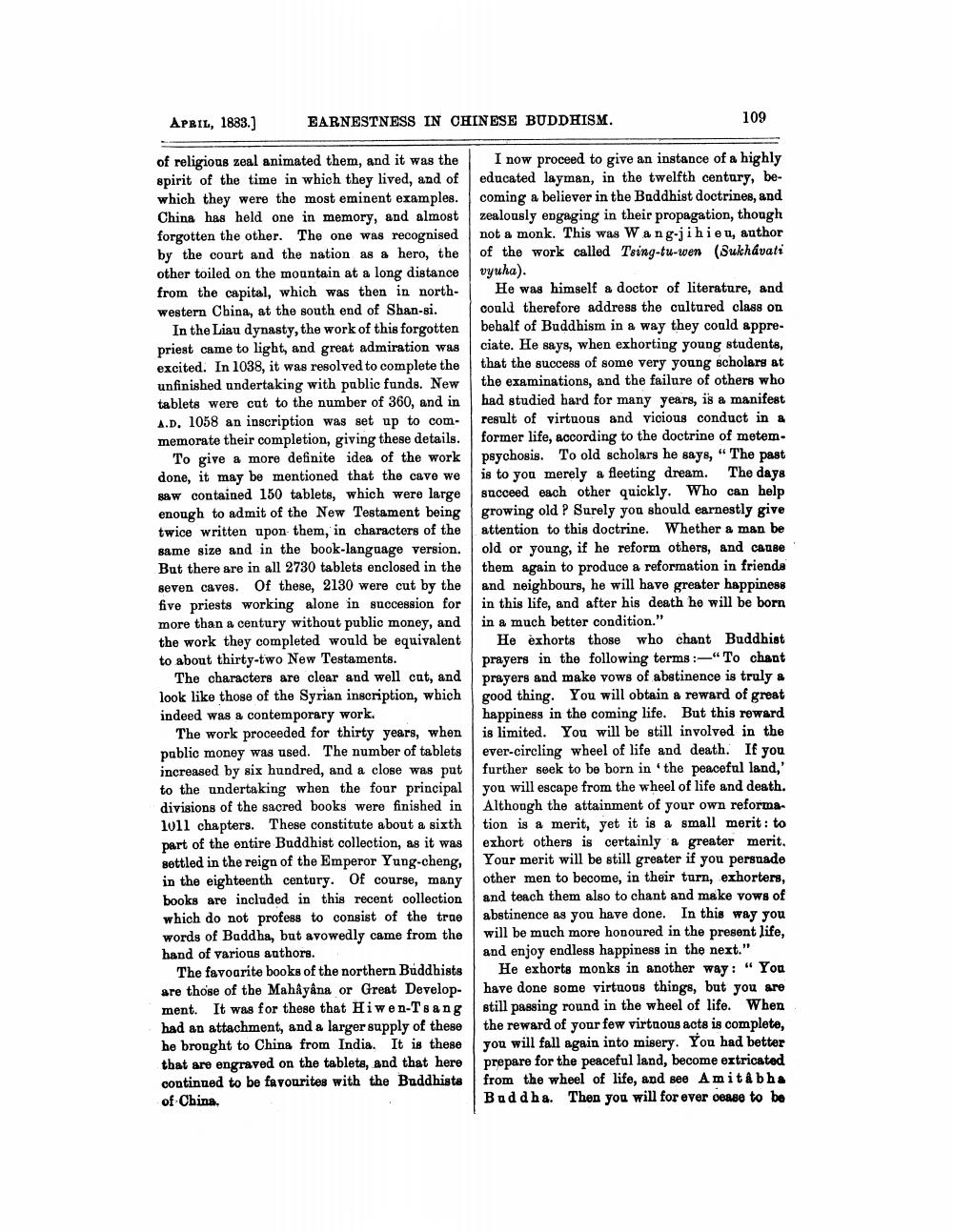________________
APRIL, 1883.)
EARNESTNESS IN CHINESE BUDDHISM.
109
of religious zeal animated them, and it was the spirit of the time in which they lived, and of which they were the most eminent examples. China has held one in memory, and almost forgotten the other. The one was recognised by the court and the nation as a hero, the other toiled on the mountain at a long distance from the capital, which was then in north. western China, at the south end of Shan-si.
In the Liau dynasty, the work of this forgotten priest came to light, and great admiration was excited. In 1038, it was resolved to complete the unfinished undertaking with public funds. New tablets were cut to the number of 360, and in A.D. 1058 an inscription was set up to commemorate their completion, giving these details.
To give a more definite idea of the work done, it may be mentioned that the cave we saw contained 150 tablets, which were large enough to admit of the New Testament being twice written upon them, in characters of the same size and in the book-language version. But there are in all 2730 tablets enclosed in the seven caves. Of these, 2130 were cut by the five priests working alone in succession for more than a century without public money, and the work they completed would be equivalent to about thirty-two New Testaments.
The characters are clear and well cut, and look like those of the Syrian inscription, which indeed was a contemporary work.
The work proceeded for thirty years, when public money was used. The number of tablets increased by six hundred, and a close was put to the undertaking when the four principal divisions of the sacred books were finished in 1011 chapters. These constitute about a sixth part of the entire Buddhist collection, as it was settled in the reign of the Emperor Yung-cheng, in the eighteenth century. Of course, many books are included in this recent collection which do not profess to consist of the trae words of Buddha, but avowedly came from the hand of various authors.
The favourite books of the northern Buddhists are those of the Mahâyâna or Great Development. It was for these that Hiwen-Tsang had an attachment, and a larger supply of these he bronght to China from India. It is these that are engraved on the tablets, and that here continued to be favourites with the Buddhists of China.
I now proceed to give an instance of a highly educated layman, in the twelfth century, becoming a believer in the Buddhist doctrines, and zealously engaging in their propagation, though not a monk. This was Wang-jihieu, author of the work called Tsing-tu-wen (Bukhavati vyuha).
He was himself a doctor of literature, and could therefore address the cultured class on behalf of Buddhism in a way they could appreciate. He says, when exhorting young students, that the success of some very young scholars at the examinations, and the failure of others who had studied hard for many years, is a manifest result of virtuous and vicious conduct in a former life, according to the doctrine of metempsychosis. To old scholars he says, " The past is to you merely a fleeting dream. The days succeed each other quickly. Who can help growing old P Surely you should earnestly give attention to this doctrine. Whether a man be old or young, if he reform others, and cause them again to produce a reformation in friends and neighbours, he will have greater happiness in this life, and after his death he will be born in a much better condition."
He exhorts those who chant Buddhist prayers in the following terms :-"To chant prayers and make vows of abstinence is truly a good thing. You will obtain a reward of great happiness in the coming life. But this reward is limited. You will be still involved in the ever-circling wheel of life and death. If you further seek to be born in the peaceful land,' you will escape from the wheel of life and death. Although the attainment of your own reformation is a merit, yet it is a small merit: to exhort others is certainly a greater merit, Your merit will be still greater if you persuade other men to become, in their turn, exhorters, and teach them also to chant and make vows of abstinence as you have done. In this way you will be much more honoured in the present life, and enjoy endless happiness in the next."
He exhorts monks in another way: " You have done some virtuous things, but you are still passing round in the wheel of life. When the reward of your few virtuous acts is complete, you will fall again into misery. You had better prepare for the peaceful land, become extricated from the wheel of life, and see Amitabha Buddha. Then you will for ever cease to be




